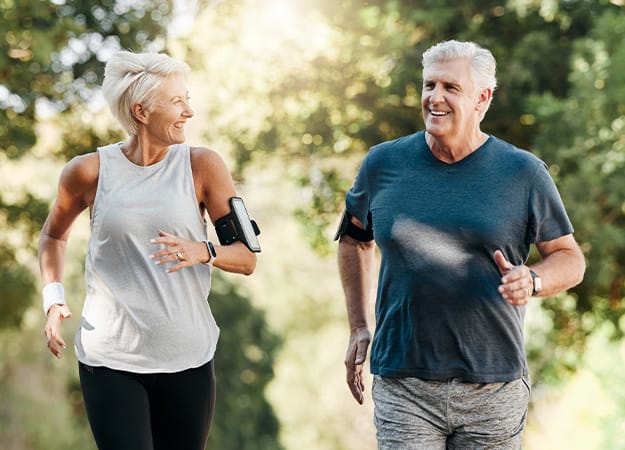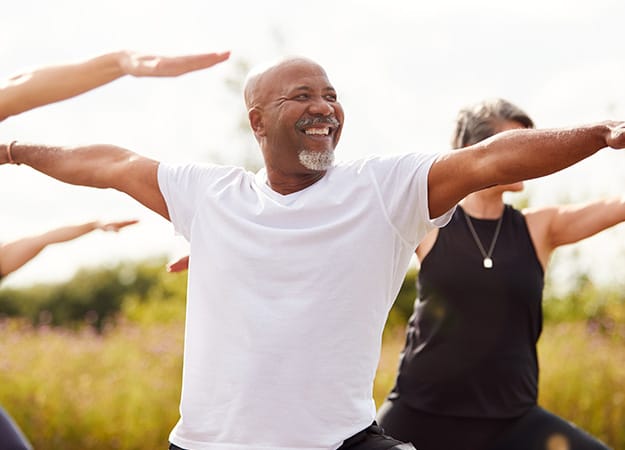The scientific community has recently been drawn to the intriguing relationship between testosterone and aging, particularly concerning our biological age.
As studies uncover the broader potential of testosterone, it becomes evident that this hormone holds the key to a more youthful health status from the inside out.
From its influence on various physiological functions to its impact on overall health and quality of life, testosterone is garnering attention for its positive effects on aging.
Find out how increased testosterone can help you transcend your vitality to longevity.

Research Found Higher Testosterone Levels Are Associated With Biologically Younger Age in Men
Time May Not Indicate Your Actual Age
The passage of time may not always be an accurate indicator of a person’s actual age.
While chronological age is simply the number of years a person has lived since birth, it does not fully reflect the overall condition of their body and health.
Each human possesses a distinct biological age, often called epigenetic age, which considers various physiological and molecular changes throughout life. This concept has garnered significant attention from the scientific community, suggesting that one can influence their age through lifestyle modifications and interventions.
And yes, adopting healthier habits and making conscious choices may slow the aging process and even appear and feel younger than our chronological age suggests.
This growing interest in understanding biological age has opened up possibilities for developing age-defying strategies to enhance overall well-being and longevity.
Factors That Affect How Fast We Age Biologically
A person’s biological age is influenced by an intricate interplay of various factors that can accelerate or decelerate the aging process.
Genetics
One crucial factor is genetics, as specific genes have been associated with either faster or slower biological aging.
For instance, a study published in Frontiers in Genetics (2021) identified genetic variants linked to longer telomeres, which are protective caps at the end of chromosomes, suggesting a potential link to slower biological aging.
Lifestyle
Lifestyle choices also play a significant role. Regular exercise has been shown to reduce biological age, as demonstrated by a study in Springer (2022), where physically active individuals displayed a better Health Aging Index (HAI) score.
Diet
Diet is equally important. A Mediterranean diet rich in fruits, vegetables, and healthy fats has been associated with lower biological age in a study published in Science Direct (2022). The study suggests this anti-aging effect is due to the diet’s high polyphenol content.
Environment and Bad Habits
Chronic stress and exposure to environmental toxins can accelerate aging processes by causing cellular damage and inflammation.
Meanwhile, smoking is a profound accelerator, as shown in a study published in BMC (2022), where smokers displayed accelerated epigenetic aging, manifested by disease development and earlier death in later life.

Increased Testosterone Slows Aging, Research Shows
A study published in GeroScience (2023) explored the potential of increased testosterone in promoting healthy aging by examining its association with DNA methylation-based biomarkers of age and mortality risk.
What Did the Study Reveal?
The study included 1,062 postmenopausal women without hormone therapy and 1,612 men of European descent from three population-based cohorts.
The findings revealed that Sex Hormone Binding Globulin (SHBG) was linked to decreased DNA methylation of Plasminogen Activator Inhibitor-1 (DNAm PAI-1) in men and women.
Meanwhile, the testosterone/estradiol (TE) ratio was associated with decreased Pheno Age Acceleration (AA) among men. Higher testosterone levels were also associated with decreased DNAm PAI-1 in men.
How Important Are the Findings?
These results suggest that higher testosterone levels and TE ratios contribute to a younger biological age and promote healthy aging by slowing epigenetic age acceleration.
Accordingly, testosterone may prolong lifespan by impacting DNAm PAI-1, associated with lower mortality and morbidity risk.
The research also highlights the role of sex steroid hormones, particularly testosterone, in influencing DNA methylation patterns. It suggests they may be relevant factors in sex-specific health disparities and healthy aging processes.
Further investigation behind these associations could pave the way for interventions targeting hormone levels to promote better health outcomes and extend lifespan

Established Biomarkers That Measure the Pace of Aging
Measuring the pace of aging requires reliable biomarkers that reflect the intricate processes influencing our biological age.
These biomarkers include SHBG, DNAm PAI-1, AA, and the TE ratio.
How do these indicators offer valuable insights into various aspects of aging, providing essential information for age-related research?
Sex Hormone Binding Globulin (SHBG): SHBG is a protein that binds to sex hormones like testosterone and estradiol in the bloodstream. It is considered a biomarker of aging as its levels can change with age, influencing the availability of sex hormones in the body and potentially impacting various health aspects.
Plasminogen Activator Inhibitor-1 (DNAm PAI-1): This biomarker is associated with age-related changes and may play a role in cardiovascular health, clotting, and inflammation processes, making it relevant in assessing the pace of biological aging.
Pheno Age Acceleration (AA): Pheno AA estimates an individual’s chronological age vs. biological age based on various phenotypic features. It provides insights into how well a person is aging and whether they are experiencing accelerated or decelerated aging compared to their peers.
Testosterone/estradiol (TE) ratio: The TE ratio compares testosterone levels to estradiol. This ratio can offer insights into hormonal balance, which may affect aging and overall health, particularly in men. Abnormal hormone ratios may indicate potential age-related health issues affecting aging processes.
How to Slow Aging With Testosterone Therapy
Testosterone replacement therapy (TRT) has conventionally been prescribed for individuals with hormone deficiencies to address sexual health issues and related concerns.
However, groundbreaking findings from the 2023 GeroScience study have emphasized a more significant association between testosterone and aging.
How Does TRT Work?
TRT involves the administration of synthetic or bioidentical testosterone to supplement the body’s natural levels and restore hormonal balance.
The type of testosterone used in therapy can vary. Bioidentical testosterone is structurally identical to the hormone naturally produced in the body, making it a preferred option for most individuals due to its closer resemblance and lower risks of side effects.
Synthetic testosterone, on the other hand, may be prescribed when specific dosages or formulations are required.
How Is TRT Given?
TRT can be administered through different methods, including transdermal patches, gels, injections, oral tablets, and pellets. The choice of administration route depends on patient preference, medical history, and the healthcare provider’s recommendation.
TRT for Healthy Aging
Beyond its recognized impact on sexual health, emerging research suggests broader benefits of TRT for healthy aging.
Individuals receiving TRT have observed improved muscle mass and strength, increased bone density, and enhanced cognitive function. Moreover, TRT may positively influence cardiovascular health by decreasing fat mass and improving lipid profiles.
As our understanding of testosterone’s impact on aging advances, TRT could evolve into a foundational approach to promote healthy aging and improve the overall quality of life.
Yunique Medical provides FUNCTIONAL MEDICINE for optimized health and performance. We offer customized, scientifically advanced treatments to create a new state of human thriving. Why be ordinary when you can be optimal?
HUMAN 2.0 begins here!
Contact us to schedule your FREE consultation at one of our three locations in Florida – Ocala, Fruitland Park (The Villages), and Daytona.
UP NEXT:

